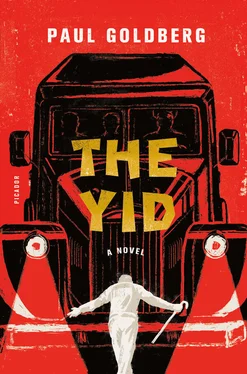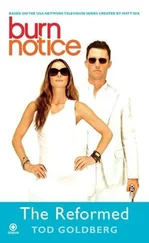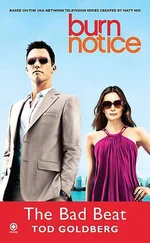The translation was stilted and academic, yet the story sent chills down Levinson’s spine: a usurper and his satraps murder an ineffectual monarch.
Surely, Mikhoels would cast himself as the bumbling, doomed king. He would inject his character with complexity, faith, and moral superiority over his killers.
That would leave Mikhoels in need of a strong Bolingbroke, the leader of the revolution, someone who understood that objective laws of history inevitably demand regicide, a komandir from another time. Was any member of the ensemble better schooled in the art of prevailing by force? Who at GOSET could play der komandir better than Komandir Levinson?
After reading the play, Levinson went up to Mikhoels’s office, the sanctum he had avoided for over a decade. The reception room door was ajar. In the inner office, Mikhoels lay on a leather sofa. His shoes were in the center of the room, atop a small pile of manuscripts. He was writing on a pad.
Mikhoels seemed startled, obviously annoyed.
“I know we haven’t been the best of friends…” said Levinson in Yiddish. “But I have to agree with your choice of Shakespeare.”
Levinson stood in the doorway to avoid towering over the sofa.
“Thank you, Khaver Levinson.” Comrade Levinson. Very formal.
Mikhoels sat up. Height was unavoidably an element of their interplay.
“I’ve read the play,” said Levinson. “It’s really about our revolution.”
“ Our revolution?”
Yes, strong leaders like Bolingbroke were the stokers of our worker-peasant revolution. That matter was beyond dispute. Levinson had come to Mikhoels to negotiate a peace treaty, to trade concessions, to secure the part of a heroic leader, not to be put on the spot.
“I can’t recall a revolution … how does it end?”
Levinson recited his own translation:
Ikh for bald opvashn, inem Heylikn Land
Dos merderishe blut
Fun mayn zindiker hant,
Mikhoels repeated the line, his mind bouncing it into Russian or German.
“Yes, Richard II would be an excellent selection,” Mikhoels said. “Of course, in Yiddish, the Bolingbroke conspiracy would be reminiscent of the Protocols of the Elders of Zion, and that final declaration would be, I’d say, passionately Zionist.
“I don’t think the audience will have the courage to applaud. They’d be looking around to make sure that no one is watching. Then they would go home, lock the doors, and cry. I am not critical of that play, Khaver Levinson, because we are, first of all, educators, but I have no plans to stage it.”
Levinson stood silently.
“You’ve probably heard of concept drawings for Richard, but you’ve read the wrong Richard. I was thinking Richard III .”
Mikhoels’s left hand rose slowly to his forehead. His index finger tapped against the bridge of the nose, with two more fingers landing behind it to transform his soaring forehead into a blackboard.
“Richard III,” Mikhoels repeated. The subtext was hard to miss: Count them if you are able, Levinson: not two, but three. Richard Three .
Levinson turned around and left the room. In the hallway, he expected to hear an explosion of hysterical laughter, yet he heard nothing. Mikhoels was done.
* * *
“Look, comrades, why don’t you walk back to the house, and I’ll get rid of the truck,” says Lewis.
“As the commander, I agree,” says Levinson. “One young man can do this better than two old ones.”
“Take this,” says Levinson, handing Lewis a heavy, meter-long sword, its scabbard attached to a wide, well-oiled belt.
The blade is curved, the handle long enough for the sword to be held with two hands. Lewis can’t resist the temptation to let the sword pivot from side to side. The handle is so perfect a counterweight to the blade that the sword seems to move on its own.
“Krasnaya kavaleriya,” he says, his hand gliding over the curve of the scabbard. Red cavalry.
Iosif Vissarionovich Stalin devotes his early morning hours to watching children play.
His children are not flesh and blood. They come from illustrations from magazines he hangs on the once barren walls of his study. These are idyllic scenes: a girl picking flowers, a boy holding a model plane.
His mind is reaching heights of clarity he hasn’t known before.
He goes to bed in early hours of the morning, after guests stumble out the door (the dacha has one low step) into the massive limousine.
At night, in solitude of his private quarters, he hears the floorboards creak. The sounds resemble footsteps, albeit disjointed, like little jaunts to no particular place. Before he falls asleep, he hears a sound akin to purring. It gives him warmth, and in the early hours of the morning, he sees the children step off the illustrations and play in the sunlight of the coming day.
Thus, on the morning of February 25, he sees a girl pick flowers on the carpet in the Big Dining Room. A boy puts wings on an airplane in the Small. Day after day, he adds children to his displays, and in the mornings, they stir. At dawn, the children are his companions, and then they vanish, to give him room to wield affairs of state.
Sleep no longer matters to the Czar. Two hours out of twenty-four are quite enough, even too long. Less may be better if clarity is his goal.
At night, he thinks that he can feel the breath of history. His cause is just, his victory assured. The Czar’s orders fly to every corner of his czardom. He needs freight trains, as many as can be spared, but he stops short of choking all production.
And what if choking occurs? What would he rather have, a Yid-free land, where children play, or wagons of rusting iron, big mountains of coal, and great corrals of sheep and goats?
The Czar knows all one needs to know about the Jews. They kill each other for a cause. There is no better sport to watch. Remember that treacherous Yid Zinoviev, grabbing his executioners’ feet, licking their boots, shouting something about shema and Adonoy , their God? Forget your God; your Adonoy is mine, Zinoviev! He serves the Czar! He works for Stalin. And he is naming names.
The lists are often on Stalin’s mind. He can imagine the multitude of Jewish, foreign-sounding names, and he can see the gallows he’ll construct for killer doctors who had the gall to plot against him.
He’ll stand where Czar Ivan stood to watch beheadings.
Barbaric? No! When teaching is your goal, more blood is better. Hang some, behead a few. Then, stand upon a tower and watch the start of lynching, the pogrom, the biggest of all time, a Kristallnacht times ten, or times a hundred! Americans will telegraph a protest, but what strength do they have? Bogged down in Korea, they have no real army. His army is the biggest the world has seen. Let’s say Americans blow up the atom. He’ll blow up hydrogen then!
His soul dances amid the flames …
As the pogroms slow down to give the weary Muscovites a chance to sleep and to recover from days of murder, fire, and rape, surviving vermin will start emerging from their holes and run in the direction of the waiting trains. Their own Lazar Kaganovich, a product of deicidal seed, Stalin’s Minister of Transportation, is making preparations.
Should Foul Lazar be placed on the last train, as captain of a sinking ship? Perhaps. And yet a bullet in the head is more dependable than rails. Give Beria the pistol … then Beria will get his bullet from someone else. It’s time … use Zhukov? And dispatch Molotov …
In morning solitude, the Czar sucks life from happy children and makes his plans.
Читать дальше












